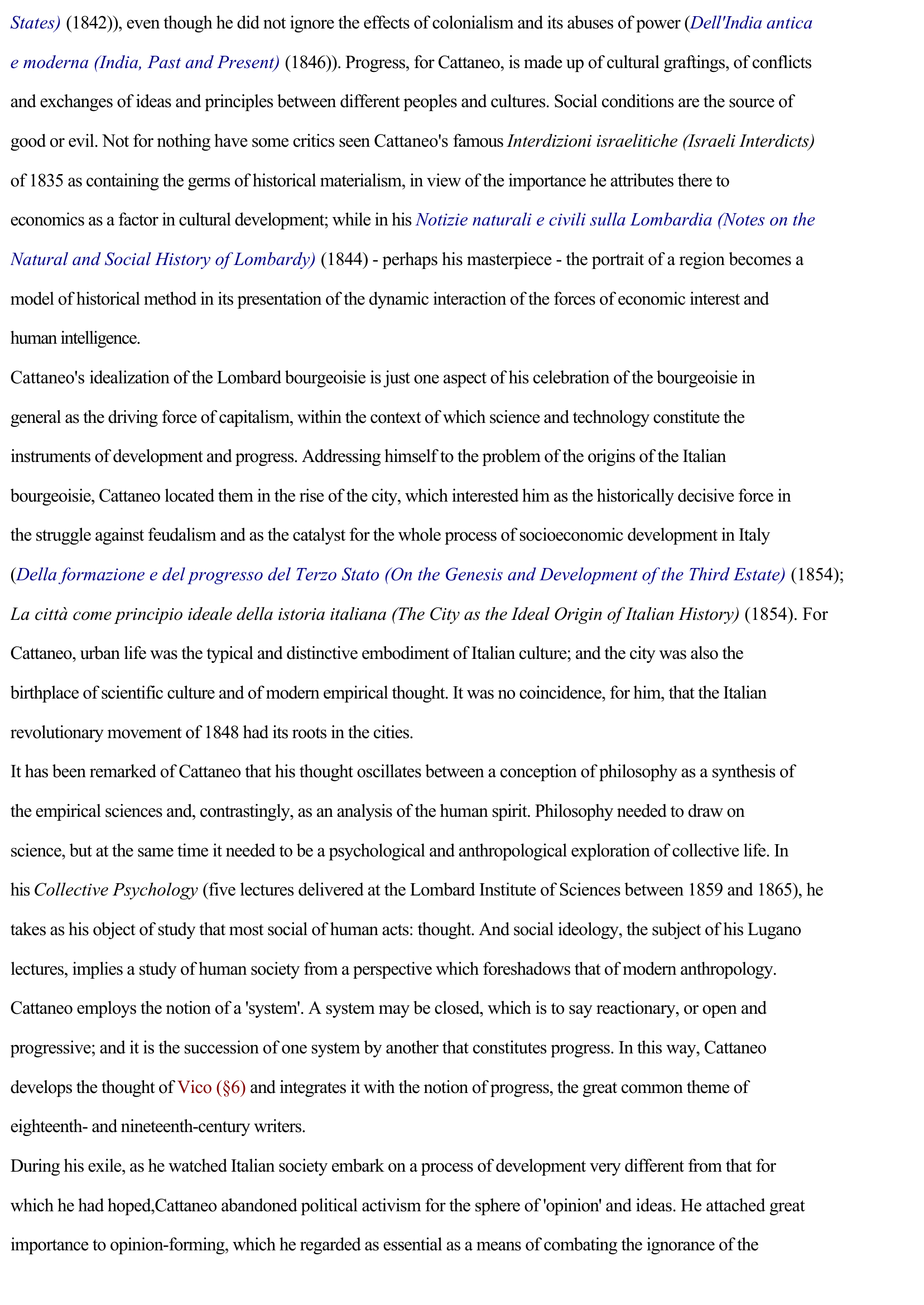Cattaneo, Carlo
Publié le 25/02/2010

Extrait du document
The figurehead of the Italian democratic movement prior to the unification of Italy, Carlo Cattaneo developed a theory of federalism as a practice of self-government, envisaging a United States of Italy. He identified the bourgeoisie as the most dynamic force in contemporary history and regarded scientific culture as the engine of progress. Often dubbed the first Italian positivist, he perceived empirical philosophy as a kind of synthesis of all the sciences, but also stressed its anthropological and psychological dimensions and above all its character as a methodology of knowledge; his objective was to study human thought. The great themes of Cattaneo's philosophy are nature, the individual and society; particularly the last. Cattaneo represents the most progressive trends in Italian thought in the first half of the nineteenth century. He aimed to encourage the propagation of technical and scientific knowledge in his native Lombardy in order to equip the entrepreneurial class with the expertise necessary for economic development; and to this end he founded the journal, Il Politecnico (1839-44; 1851-63). Until 1848, Cattaneo had formed part of the legal opposition to the regime, but when Milan rose against the Austrians on 18 March of that year, Cattaneo took an active, leading role in the Five Days' Uprising. He was critical of the provisional government, however, and when the Austrians returned, left for Paris, where he published L'Insurrection de Milan en 1848 (The Milan Uprising of 1848). Shortly afterwards, he left Paris for Switzerland, where he settled permanently in Castagnola, near Lugano. From his exile in Switzerland, Cattaneo voiced his often fierce opposition to the principal political currents in Italy, and forged a role for himself as the great 'prompter' and moving spirit of the Italian democrats, and the leading proponent of federalism against unitary solutions.
«
States) (1842)), even though he did not ignore the effects of colonialism and its abuses of power ( Dell'India antica
e moderna (India, Past and Present) (1846)).
Progress, for Cattaneo, is made up of cultural graftings, of conflicts
and exchanges of ideas and principles between different peoples and cultures.
Social conditions are the source of
good or evil.
Not for nothing have some critics seen Cattaneo's famous Interdizioni israelitiche (Israeli Interdicts)
of 1835 as containing the germs of historical materialism, in view of the importance he attributes there to
economics as a factor in cultural development; while in his Notizie naturali e civili sulla Lombardia (Notes on the
Natural and Social History of Lombardy) (1844) - perhaps his masterpiece - the portrait of a region becomes a
model of historical method in its presentation of the dynamic interaction of the forces of economic interest and
human intelligence.
Cattaneo's idealization of the Lombard bourgeoisie is just one aspect of his celebration of the bourgeoisie in
general as the driving force of capitalism, within the context of which science and technology constitute the
instruments of development and progress.
Addressing himself to the problem of the origins of the Italian
bourgeoisie, Cattaneo located them in the rise of the city, which interested him as the historically decisive force in
the struggle against feudalism and as the catalyst for the whole process of socioeconomic development in Italy
(Della formazione e del progresso del Terzo Stato (On the Genesis and Development of the Third Estate) (1854);
La città come principio ideale della istoria italiana (The City as the Ideal Origin of Italian History) (1854).
For
Cattaneo, urban life was the typical and distinctive embodiment of Italian culture; and the city was also the
birthplace of scientific culture and of modern empirical thought.
It was no coincidence, for him, that the Italian
revolutionary movement of 1848 had its roots in the cities.
It has been remarked of Cattaneo that his thought oscillates between a conception of philosophy as a synthesis of
the empirical sciences and, contrastingly, as an analysis of the human spirit.
Philosophy needed to draw on
science, but at the same time it needed to be a psychological and anthropological exploration of collective life.
In
his Collective Psychology (five lectures delivered at the Lombard Institute of Sciences between 1859 and 1865), he
takes as his object of study that most social of human acts: thought.
And social ideology, the subject of his Lugano
lectures, implies a study of human society from a perspective which foreshadows that of modern anthropology.
Cattaneo employs the notion of a 'system' .
A system may be closed, which is to say reactionary, or open and
progressive; and it is the succession of one system by another that constitutes progress.
In this way, Cattaneo
develops the thought of Vico (§6) and integrates it with the notion of progress, the great common theme of
eighteenth- and nineteenth-century writers.
During his exile, as he watched Italian society embark on a process of development very different from that for
which he had hoped,Cattaneo abandoned political activism for the sphere of 'opinion' and ideas.
He attached great
importance to opinion-forming, which he regarded as essential as a means of combating the ignorance of the.
»
↓↓↓ APERÇU DU DOCUMENT ↓↓↓
Liens utiles
- Cattaneo, Carlo
- Le personnage de GEPPETTO de Carlo Collodi
- AFFREUX PASTIS DE LA RUE DES MERLES (L’) Carlo Emilio Gadda (résumé)
- AVARE JALOUX (L’) Carlo Goldoni (résumé & analyse)
- ARISTODÈME. (résumé & analyse) de Carlo de Dottori

































